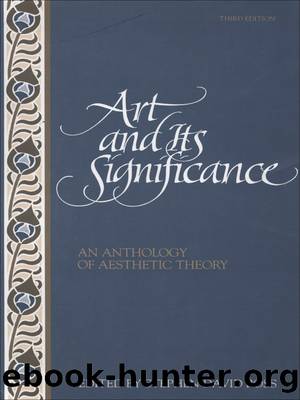Art and its Significance by Stephen David Ross

Author:Stephen David Ross
Language: eng
Format: epub
Publisher: State University of New York press
Published: 1994-11-15T00:00:00+00:00
(iv) THE CONCERN FOR THE BEAUTIFUL IN NATURE AND IN ART. When Kant raises the question of the interest that is taken in the beautiful not empirically, but a priori, this question of the interest in the beautiful as opposed to the fundamental statement of the absence of interest in aesthetic pleasure raises a new problem and completes the transition from the standpoint of taste to the standpoint of genius. It is the same doctrine that is developed in connection with both phenomena. It is important, in establishing foundations, to free the âcritique of tasteâ from sensualistic and rationalistic prejudices. It is quite in order that here the question of the type of object being aesthetically judged (and thus the whole question of the relation between the beauty of nature and that of art) is not asked by Kant. But this dimension of the question is necessarily opened up if one thinks the standpoint of taste throughâwhich involves going beyond it.7 The interesting significance of the beautiful is the really operative problem in the Kantian aesthetic. It is different for nature and art, and the comparison between the naturally and the artistically beautiful brings the problem to a head.
Here we find Kant himself.8 As we would expect, it is not for the sake of art that Kant goes beyond âdisinterested pleasureâ and enquires into the interest in the beautiful. From the doctrine of the ideal of beauty we had derived one advantage of art as against natural beauty: the advantage of being a more direct expression of the moral. Kant, on the contrary, emphasises primarily (§ 42) the advantage of natural over artistic beauty. It is not only for the pure aesthetic judgment that natural beauty has an advantage, namely to make it clear that the beautiful depends on the consonance of the thing represented with our cognitive faculty. This is so clearly the case with natural beauty because it possesses no significance of content, and thus manifests the judgment of taste in its unintellectualised purity.
But it does not have only this methodological advantage; according to Kant it also has one of content, and he obviously thinks a great deal of this point of his doctrine. Beautiful nature is able to arouse an immediate interest, namely a moral one. Finding the beautiful forms of nature beautiful points beyond itself to the thought âthat nature has produced that beauty.â Where this thought arouses interest we have cultivation of the moral sensibility. While Kant, instructed by Rousseau, refuses to argue back from the refinement of taste for the beautiful in general to moral sensibility, the sense of the beauty of nature is for Kant a special case. That nature is beautiful arouses interest only in someone who âhas already developed his interest in the morally good.â Hence the interest in natural beauty is ârelated to the moral sphere.â By observing the unintentional consonance of nature with our pleasure, which is independent of any interest, i.e., the wonderful finality of nature for us, it points to us as to the ultimate goal of creation, to our âmoral destinyâ.
Download
This site does not store any files on its server. We only index and link to content provided by other sites. Please contact the content providers to delete copyright contents if any and email us, we'll remove relevant links or contents immediately.
The Japanese by Christopher Harding(1135)
Glittering Images: A Journey Through Art From Egypt to Star Wars by Camille Paglia(828)
Watercolor With Me in the Forest by Dana Fox(788)
A Theory of Narrative Drawing by Simon Grennan(783)
The Story of the Scrolls by The Story of the Scrolls; the M(767)
Boris Johnson by Tom Bower(654)
Frida Kahlo by Frida Kahlo & Hayden Herrera(631)
This Is Modern Art by Kevin Coval(631)
The Art and Science of Drawing by Brent Eviston(619)
AP Art History by John B. Nici(618)
Banksy by Will Ellsworth-Jones(600)
About Looking by John Berger(597)
Van Gogh by Gregory White Smith(587)
Scenes From a Revolution by Mark Harris(584)
War Paint by Woodhead Lindy(582)
Draw More Furries by Jared Hodges(572)
Ecstasy by Eisner.;(564)
Young Rembrandt: A Biography by Onno Blom(549)
100 Greatest Country Artists by Hal Leonard Corp(543)
